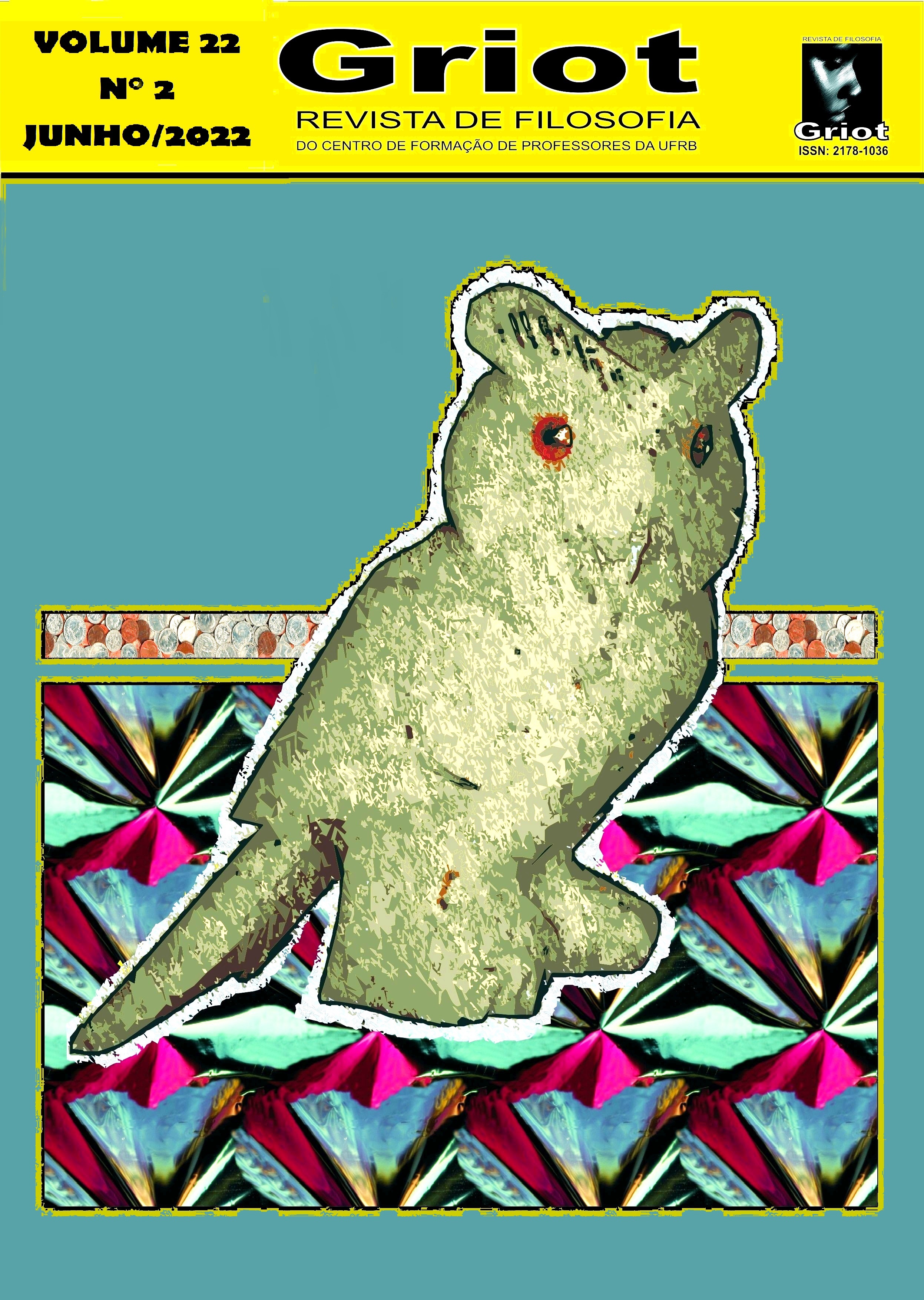Of education as an affirmation of life between art and philosophy according to Nietzsche in the film “Dead poets society”
DOI:
https://doi.org/10.31977/grirfi.v22i2.2872Keywords:
Education; Nietzsche; Philosophy; Art; Culture.Abstract
Based on the film “Dead Poets Society” (1989), the article points out the chaos created within the traditional North American school Welton through the work of Professor John Keating in the establishment of new teaching and learning methods for literature, as it tends to to encourage the questioning about the meaning and value of life and the cultivation of oneself as a possibility of producing a new and extemporaneous content and knowledge as an affirmation of the forces of life. Thus, based on Friedrich Nietzsche's (1844-1900) critique of “historical culture” as a product of the contradiction involving life and culture, the article emphasizes that the knowledge that has roots in “historical culture” is characterized as an unproductive capital, signaling the inexistence of rights of Philosophy between historical culture and the formative-educational process and the need for a correlation between art and philosophy before science and truth. Therefore, opposing the transformation of philosophy into erudition in the name of "historical culture" and the "philosophers" who place themselves at its service, Nietzsche denounces the reduction of being, life and vision to the framework of concepts, opinions, pasts, books in a critical analysis that focuses on the question involving philosophy professors between life and the science of universal becoming: philosophers or servers of “history”?
Downloads
References
ARALDI, Clademir Luís. Sociedade dos poetas mortos: uma perspectiva nietzschiana. In: Nietzsche: Em Atos. Nietzsche Pensa a Educação 2. Revista Educação Especial: Biblioteca do Professor. São Paulo: Segmento, s/d, p. 58-67;
ASSOCIATED PRESS. Real-life professor inspires “Dead Poets” character. Focus: Samuel F. Pickering, Jr. In: TIMES DAILY, Serving Northwest Alabama, Home Edition, v. 120, n. 191, 4B, 10 jul. 1989.
BRUM, José Thomaz. O demasiado humano conhecimento. In: Nietzsche: Conhecimento e Saber. Nietzsche Pensa a Educação 2. Revista Educação Especial: Biblioteca do Professor. São Paulo: Segmento, s/d, p. 36-45;
DIAS, Rosa Maria. A educação e a incultura moderna. In: Nietzsche Pensa a Educação. Nietzsche Pensa a Educação 2. Revista Educação Especial: Biblioteca do Professor. São Paulo: Segmento, s/d, p. 16-25;
HORÁCIO. Obras de Horácio. Tradução (em verso português) de José Agostinho de Macedo. Tomo 1. Lisboa: Impressão Régia, 1806.
MARIANO DA ROSA, Luiz Carlos. Autoformação (“do homem completo”). Revista FACED (Entreideias: educação, cultura e sociedade), UFBA – Universidade Federal da Bahia, Salvador / BA, n. 4, p. 87-103, jul./dez. 2008.
MARIANO DA ROSA, Luiz Carlos. Determinismo e liberdade no processo de construção do conhecimento: da condição humana entre os muros da escola. Revista da Faculdade de Educação, UNEMAT - Universidade do Estado de Mato Grosso, Cáceres / MT, vol. 23, ano 13, n. 1, p. 75-97, jan./ jun. 2015a.
MARIANO DA ROSA, Luiz Carlos. Do sistema educacional e o desafio da fundação de um novo homem entre a organização científico-técnica e a formação econômico-social. Cadernos Zygmunt Bauman, UFMA – Universidade Federal do Maranhã, São Luís / MA, v. 5, n. 10, p. 19-41, jul./dez. 2015b.
MARIANO DA ROSA, Luiz Carlos. Do “vir-a-ser” nietzschiano (do “instinto natural filosófico”). Revista Partes (São Paulo / SP), v. 11, s/n, 2011.
MARIANO DA ROSA, Luiz Carlos. Schopenhauer e Nietzsche: do dualismo metafísico ao princípio da unidade-múltipla. Revista Filosofia Capital – RFC (Brasília, Distrito Federal, Brasil), vol. 9, p. 85-98, 2014 (Edição Especial: Concepções acerca da Verdade: Subjetividade, Educação e Multidimensionalidade).
NIETZSCHE, Friedrich W. Além do bem e do mal ou prelúdio de uma filosofia do futuro. Tradução de Márcio Pugliesi. Curitiba/PR: Hemus, 2001.
NIETZSCHE, Friedrich W. Considerações extemporâneas. In: NIETZSCHE, Friedrich W. Obras Incompletas. Os Pensadores. Tradução e notas de Rubens Rodrigues Torres Filho. São Paulo: Nova Cultural, 1996a, p. 267-336.
NIETZSCHE, Friedrich W. Humano, demasiado humano (Volume I). In: NIETZSCHE, Friedrich W. Obras Incompletas. Os Pensadores. Tradução e notas de Rubens Rodrigues Torres Filho. São Paulo: Nova Cultural, 1996b, p. 61-134.
NIETZSCHE, Friedrich W. Obras Incompletas. Os Pensadores. Tradução e notas de Rubens Rodrigues Torres Filho. São Paulo: Nova Cultural, 1996.
NIETZSCHE, Friedrich W. O livro do filósofo. Tradução de Antonio Carlos Braga. São Paulo: Escala, 2007.
NIETZSCHE, Friedrich W. O último filósofo: o filósofo (considerações sobre o conflito entre a arte e conhecimento). In: NIETZSCHE, Friedrich W. O livro do filósofo. Tradução de Antonio Carlos Braga. São Paulo: Escala, 2007, p. 13-68.
SOCIEDADE DOS POETAS MORTOS. O Clube dos Poetas Mortos (português). Dead Poets Society (inglês). Direção: Peter Weir. Roteiro: Tom Schulman. Elenco: Robin Williams (John Keating); Robert Sean Leonard (Neil Perry); Ethan Hawke (Todd A. Anderson). Allelon Ruggiero (Stephen Meeks Jr.); Gale Hansen (Charlie Dalton); Josh Charles Knox (Overstreet); Dylan Kussman (Richard S Cameron); James Waterston (Gerard Pitts); Norman Lloyd (Sr. Nolan); Kurtwood Smith (Sr. Perry); Carla Belver (Sr.ª Perry); Leon Pownall (McAllister); George Martin (Dr. Hager); Matt Carey (Hopkins). Gênero: Drama. Idioma: Inglês. DVD (128 min). Distribuição: Walt Disney Studios. Produção: Estados Unidos, 1989.
THOREAU, Henry David. Walden ou a vida nos bosques. Tradução de Astrid Cabral. 7. ed. São Paulo: Editora Ground, 2007.
Downloads
Published
How to Cite
Issue
Section
License
Copyright (c) 2022 Luiz Carlos Mariano Da Rosa

This work is licensed under a Creative Commons Attribution 4.0 International License.
The authors who publish in Griot: Revista de Filosofia maintain the copyright and grant the magazine the right of first publication, with the work simultaneously licensed under the Creative Commons Attribution 4.0 International License, allowing sharing and adaptation, even for commercial purposes, with due recognition of authorship and initial publication in this journal. Read more...









































































